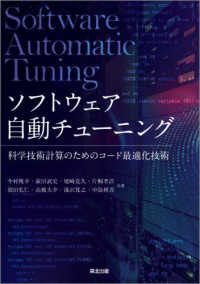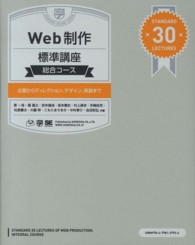- ホーム
- > 洋書
- > 英文書
- > Science / Mathematics
Full Description
In The Archive and the Aural City, Alejandro L. Madrid examines the possibilities for retrieving sounds from the archive that were not meant to be heard. Drawing on Ángel Rama's notion of the Lettered City, Madrid proposes a notion of the Aural City - a Latin American urban intellectual elite for whom sound and listening are central to the creation, recreation, and circulation of new types of knowledge. While many of these elites carry forward a nationalistic agenda, Madrid contends that the Aural City's archives and the ways they are listened to and conceived through sound and music can also help dismantle dominant frameworks of national or colonial culture and build more inclusive spaces for intellectual exchange and political mobilization. From national archives in Latin America and colonial institutions abroad to sound exhibits, instruments, and internet-based archival projects, Madrid demonstrates how the development of urban spaces are understood through sound. In this way, he expands understandings of the archive's social and sonic power.
Contents
List of Illustrations xi
List of Abbreviations xv
Acknowledgments xvii
Introduction. Questions about the Circulation of Knowledge at the Sonic Turn 1
1. Performing Listening, Writing, Reading, and the Assemblage of Archival Constellations 29
2. Patrimony, Objectification, and Representation at Mexico's Fonoteca Nactional 57
3. Critical Constellations of the Audio-Machine in Mexico and the Performativity of Archiving/Archival Labor 85
4. Things, Sound Objects, and the Legacy at the Berliner Phonogramm-Archiv's Konrad T. Preuss Collection 117
5. Mexican Rarities, Disco pirata, and the Promise of a Sound Archive of Postnational Memory 161
6. Aurality, Materiality, and the Carrillo Pianos as Archives 191
7. In Search of the Aural City: Collective Action and the Invisible Sound Archive 227
Epilogue. The Relevance of Archives in Times of Post-Truth: An Essay against Nihilism in the Neoliberal Age 270
Notes 285
Bibliography 315
Index








